人教版初中英语语法总复习【最新整理】
- 格式:doc
- 大小:130.50 KB
- 文档页数:40
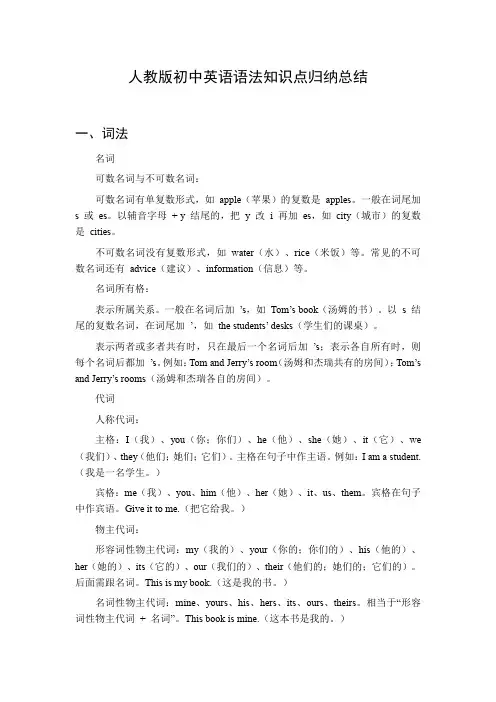
人教版初中英语语法知识点归纳总结一、词法名词可数名词与不可数名词:可数名词有单复数形式,如apple(苹果)的复数是apples。
一般在词尾加s 或es。
以辅音字母+ y 结尾的,把y 改i 再加es,如city(城市)的复数是cities。
不可数名词没有复数形式,如water(水)、rice(米饭)等。
常见的不可数名词还有advice(建议)、information(信息)等。
名词所有格:表示所属关系。
一般在名词后加’s,如Tom’s book(汤姆的书)。
以s 结尾的复数名词,在词尾加’,如the students’ desks(学生们的课桌)。
表示两者或多者共有时,只在最后一个名词后加’s;表示各自所有时,则每个名词后都加’s。
例如:Tom and Jerry’s room(汤姆和杰瑞共有的房间);Tom’s and Jerry’s rooms(汤姆和杰瑞各自的房间)。
代词人称代词:主格:I(我)、you(你;你们)、he(他)、she(她)、it(它)、we (我们)、they(他们;她们;它们)。
主格在句子中作主语。
例如:I am a student.(我是一名学生。
)宾格:me(我)、you、him(他)、her(她)、it、us、them。
宾格在句子中作宾语。
Give it to me.(把它给我。
)物主代词:形容词性物主代词:my(我的)、your(你的;你们的)、his(他的)、her(她的)、its(它的)、our(我们的)、their(他们的;她们的;它们的)。
后面需跟名词。
This is my book.(这是我的书。
)名词性物主代词:mine、yours、his、hers、its、ours、theirs。
相当于“形容词性物主代词+ 名词”。
This book is mine.(这本书是我的。
)指示代词:this(这个)、that(那个)、these(这些)、those(那些)。
![最新[复习]人教版初中英语语法大全优秀名师资料](https://uimg.taocdn.com/f1771c335f0e7cd18425368f.webp)
[复习]人教版初中英语语法大全人教版新目标初中英语语法大全初中英语语法学习提纲一、词类、句子成分和构词法:1、词类:英语词类分十种:名词、形容词、代词、数词、冠词、动词、副词、介词、连词、感叹词。
1、名词(n.): 表示人、事物、地点或抽象概念的名称。
如:boy, morning, bag, ball, class, orange.2、代词(pron.): 主要用来代替名词。
如:who, she, you, it .3、形容词(adj..):表示人或事物的性质或特征。
如:good, right, white, orange .4、数词(num.): 表示数目或事物的顺序。
如:one, two, three, first, second, third, fourth.5、动词(v.): 表示动作或状态。
如:am, is,are,have,see .6、副词(adv.): 修饰动词、形容词或其他副词,说明时间、地点、程度等。
如:now, very, here, often, quietly ,slowly.7、冠词(art..):用在名词前,帮助说明名词。
如:a, an, the. 8、介词(prep.): 表示它后面的名词或代词与其他句子成分的关系。
如in, on, from, above,behind.9、连词(conj.): 用来连接词、短语或句子。
如and, but, before . 10、感叹词(interj..)表示喜、怒、哀、乐等感情。
如:oh, well, hi, hello.2、句子成分:英语句子成分分为七种:主语、谓语、宾语、定语、状语、表语、宾语补足语。
1、主语是句子所要说的人或事物,回答是“谁”或者“什么”。
通常用名词或代词担任。
如:I‘m Miss Green.(我是格林小姐)2、谓语动词说明主语的动作或状态,回答“做(什么)”。
主要由动词担任。
如:Jack cleans the room every day. (杰克每天打扫房间)3、表语在系动词之后,说明主语的身份或特征,回答是“什么”或者“怎么样”。
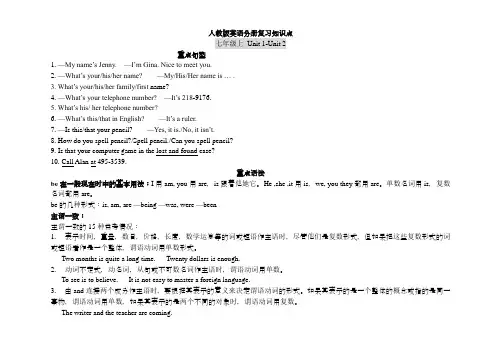
人教版英语分册复习知识点七年级上Unit 1-Unit 2重点句型1. —My name’s Jenny. —I’m Gina. Nice to meet you.2. —What’s your/his/her name? —My/His/Her name is … .3. What’s your/his/her family/first name?4. —What’s your telephone number? —It’s 218-9176.5. What’s his/ her telephone number?6. —What’s this/that in English? —It’s a ruler.7. —Is this/that your pencil? —Yes, it is./No, it isn’t.8. How do you spell pencil?/Spell pencil./Can you spell pencil?9. Is that your computer game in the lost and found case?10. Call Alan at 495-3539.重点语法be在一般现在时中的基本用法:I用am, you用are,is跟着他她它。
He ,she ,it用is,we, you they都用are。
单数名词用is,复数名词都用are。
be的几种形式:is, am, are —being —was, were —been主谓一致:主谓一致的15种常考情况:1.表示时间,重量,数目,价格,长度,数学运算等的词或短语作主语时,尽管他们是复数形式,但如果把这些复数形式的词或短语看作是一个整体,谓语动词用单数形式。
Two months is quite a long time. Twenty dollars is enough.2.动词不定式,动名词,从句或不可数名词作主语时,谓语动词用单数。
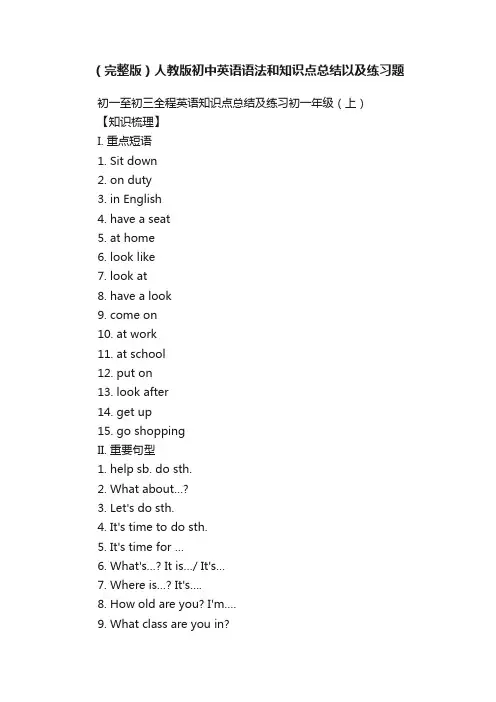
(完整版)人教版初中英语语法和知识点总结以及练习题初一至初三全程英语知识点总结及练习初一年级(上)【知识梳理】I. 重点短语1. Sit down2. on duty3. in English4. have a seat5. at home6. look like7. look at8. have a look9. come on10. at work11. at school12. put on13. look after14. get up15. go shoppingII. 重要句型1. help sb. do sth.2. What about…?3. Let's do sth.4. It's time to do sth.5. It's time for …6. What's…? It is…/ It's…7. Where is…? It's….8. How old are you? I'm….9. What class are you in?I'm in….10. Welcome to…. 11. What's …plus…? It's….12. I think…13. Who's this? This is….14. What can you see?I can see….15. There is (are) ….16. What color is it (are they)? It's (They're)…17. Whose …is this? It's….18. What ti me is it? It's….III. 交际用语1. Good morning, Miss/Mr….2. Hello! Hi!3. Nice to meet you. Nice to meet you, too.4. How are you? I'm fine, thank you/thanks. And you?5. See you. See you later.6. Thank you! You're welcome.7. Goodbye! Bye!8. What's your name? My name is ….9. Here you are. This way, please.10. Who's on duty today?11. Let's do.12. Let me see.IV. 重要语法1. 动词be的用法;2. 人称代词和物主代词的用法;3. 名词的单复数和所有格的用法;4. 冠词的基本用法;5. There be句型的用法。
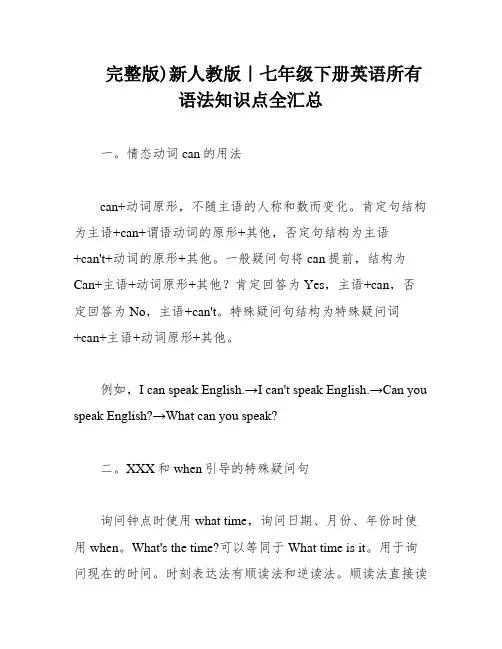
完整版)新人教版|七年级下册英语所有语法知识点全汇总一。
情态动词can的用法can+动词原形,不随主语的人称和数而变化。
肯定句结构为主语+can+谓语动词的原形+其他,否定句结构为主语+can't+动词的原形+其他。
一般疑问句将can提前,结构为Can+主语+动词原形+其他?肯定回答为Yes,主语+can,否定回答为No,主语+can't。
特殊疑问句结构为特殊疑问词+can+主语+动词原形+其他。
例如,I can speak English.→I can't speak English.→Can you speak English?→What can you speak?二。
XXX和when引导的特殊疑问句询问钟点时使用what time,询问日期、月份、年份时使用when。
What's the time?可以等同于What time is it。
用于询问现在的时间。
时刻表达法有顺读法和逆读法。
顺读法直接读出“钟点+分钟”的数字,例如7:05读作seven five,8:16读作eight sixteen。
逆读法使用介词past或to,先说分钟再说钟点。
当分钟不超过30分钟时,即30,用to表示,结构为“所差分钟(即60—所过分钟数)+to+下一个整点”,to译成“差”,差几分钟到几点,例如4:o to five。
当分钟为30分钟时用half表示,当分钟为15分钟时用a XXX表示。
三。
how引导的特殊疑问句how引导的特殊疑问句用于询问交通方式,其答语分为三种情况:a。
take a/an/the+交通工具(单数);b。
by+交通工具(单数);XXX限定词+交通工具。
例如,How do you go to school every day。
可以回答为I take a bus to go to school every day./I go to school by bus every day./I go to school on the bus every day.How far is something。
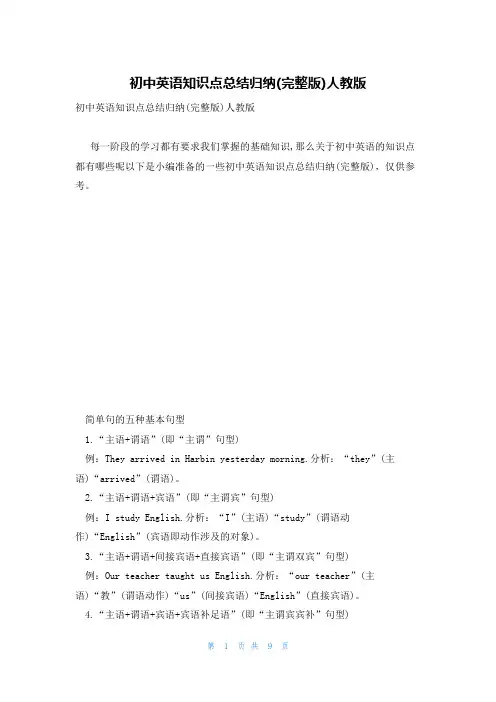
初中英语知识点总结归纳(完整版)人教版初中英语知识点总结归纳(完整版)人教版每一阶段的学习都有要求我们掌握的基础知识,那么关于初中英语的知识点都有哪些呢以下是小编准备的一些初中英语知识点总结归纳(完整版),仅供参考。
简单句的五种基本句型1.“主语+谓语”(即“主谓”句型)例:They arrived in Harbin yesterday morning.分析:“they”(主语)“arrived”(谓语)。
2.“主语+谓语+宾语”(即“主谓宾”句型)例:I study English.分析:“I”(主语)“study”(谓语动作)“English”(宾语即动作涉及的对象)。
3.“主语+谓语+间接宾语+直接宾语”(即“主谓双宾”句型)例:Our teacher taught us English.分析:“our teacher”(主语)“教”(谓语动作)“us”(间接宾语)“English”(直接宾语)。
4.“主语+谓语+宾语+宾语补足语”(即“主谓宾宾补”句型)例:He asked her to go there.分析:“he”(主语)“asked”(谓语动作)“her”(宾语即动作涉及的对象)“to go there”(补语—补充说明宾语做什么)。
5.“主语+系动词+表语”(即“主系表”句型)常用的系动词有be, keep,lie, remain, stand, become, fall, get, go, grow, turn, look, feel, seem, smell, sound, taste,等。
例:I am a teacher.分析:“I”(主语)“am”(系动词)“a teacher”(表语—即表明主语的身份)。
初中英语八种基本时态1. 一般现在时概念: 表示经常发生的动作或经常存在的状态。
常和 always , often , usually , sometimes , every day 等表时间的状语连用。
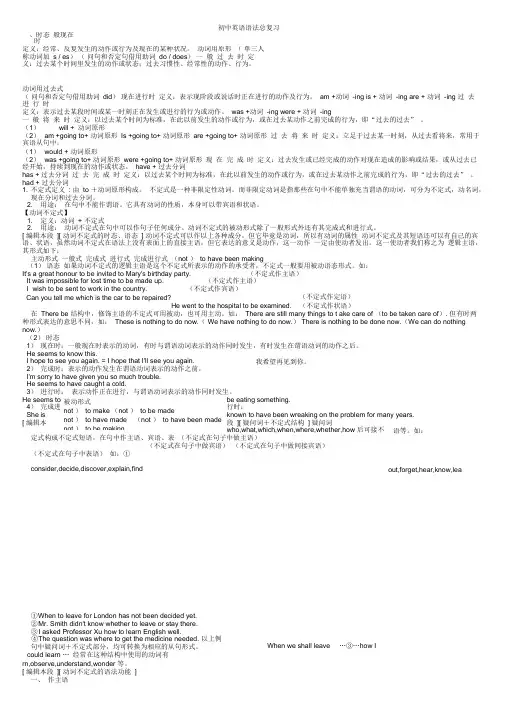
初中英语语法总复习动词用过去式( 问句和否定句借用助词 did ) 现在进行时 定义:表示现阶段或说话时正在进行的动作及行为。
am +动词 -ing is + 动词 -ing are + 动词 -ing 过 去 进 行 时定义:表示过去某段时间或某一时刻正在发生或进行的行为或动作。
was +动词 -ing were + 动词 -ing一 般 将 来 时 定义:以过去某个时间为标准,在此以前发生的动作或行为,或在过去某动作之前完成的行为,即“过去的过去” 。
(1) will + 动词原形(2) am +going to+ 动词原形 Is +going to+ 动词原形 are +going to+ 动词原形 过 去 将 来 时 定义:立足于过去某一时刻,从过去看将来,常用于宾语从句中。
(1) would + 动词原形(2) was +going to+ 动词原形 were +going to+ 动词原形 现 在 完 成 时 定义:过去发生或已经完成的动作对现在造成的影响或结果,或从过去已经开始,持续到现在的动作或状态。
have + 过去分词has + 过去分词 过 去 完 成 时 定义:以过去某个时间为标准,在此以前发生的动作或行为,或在过去某动作之前完成的行为,即“过去的过去” 。
had + 过去分词1. 不定式定义 : 由 to +动词原形构成。
不定式是一种非限定性动词。
而非限定动词是指那些在句中不能单独充当谓语的动词,可分为不定式,动名词,现在分词和过去分词。
2. 用途: 在句中不能作谓语。
它具有动词的性质,本身可以带宾语和状语。
【动词不定式】1. 定义:动词 + 不定式2. 用途: 动词不定式在句中可以作句子任何成分。
动词不定式的被动形式除了一般形式外还有其完成式和进行式。
[ 编辑本段 ][ 动词不定式的时态、语态 ] 动词不定式可以作以上各种成分,但它毕竟是动词,所以有动词的属性 动词不定式及其短语还可以有自己的宾语、状语,虽然动词不定式在语法上没有表面上的直接主语,但它表达的意义是动作,这一动作 一定由使动者发出。
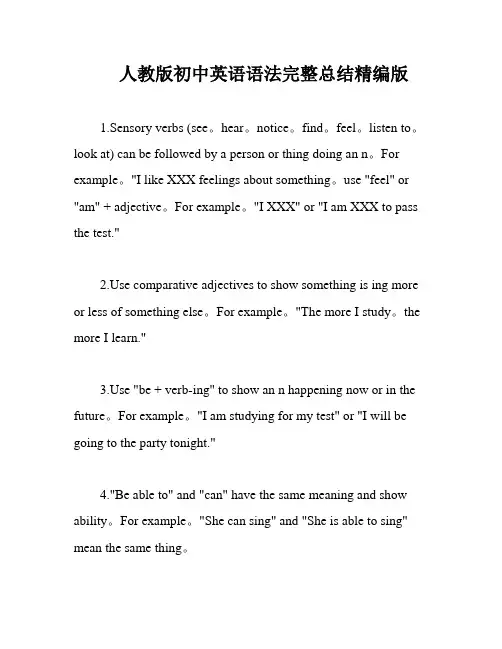
人教版初中英语语法完整总结精编版1.Sensory verbs (see。
hear。
notice。
find。
feel。
listen to。
look at) can be followed by a person or thing doing an n。
For example。
"I like XXX feelings about something。
use "feel" or "am" + adjective。
For example。
"I XXX" or "I am XXX to pass the test."e comparative adjectives to show something is ing more or less of something else。
For example。
"The more I study。
the more I learn."e "be + verb-ing" to show an n happening now or in the future。
For example。
"I am studying for my test" or "I will be going to the party tonight."4."Be able to" and "can" have the same meaning and show ability。
For example。
"She can sing" and "She is able to sing" mean the same thing。
5."A piece of cake" means something is easy。
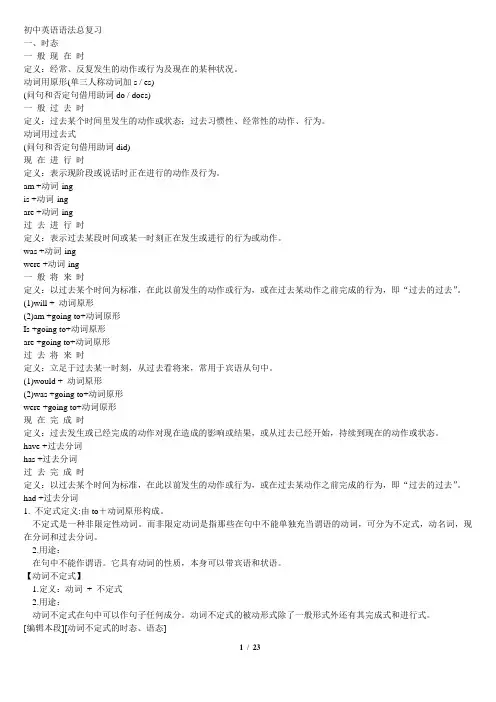
初中英语语法总复习一、时态一般现在时定义:经常、反复发生的动作或行为及现在的某种状况。
动词用原形(单三人称动词加s / es)(问句和否定句借用助词do / does)一般过去时定义:过去某个时间里发生的动作或状态;过去习惯性、经常性的动作、行为。
动词用过去式(问句和否定句借用助词did)现在进行时定义:表示现阶段或说话时正在进行的动作及行为。
am +动词-ingis +动词-ingare +动词-ing过去进行时定义:表示过去某段时间或某一时刻正在发生或进行的行为或动作。
was +动词-ingwere +动词-ing一般将来时定义:以过去某个时间为标准,在此以前发生的动作或行为,或在过去某动作之前完成的行为,即“过去的过去”。
(1)will + 动词原形(2)am +going to+动词原形Is +going to+动词原形are +going to+动词原形过去将来时定义:立足于过去某一时刻,从过去看将来,常用于宾语从句中。
(1)would + 动词原形(2)was +going to+动词原形were +going to+动词原形现在完成时定义:过去发生或已经完成的动作对现在造成的影响或结果,或从过去已经开始,持续到现在的动作或状态。
have +过去分词has +过去分词过去完成时定义:以过去某个时间为标准,在此以前发生的动作或行为,或在过去某动作之前完成的行为,即“过去的过去”。
had +过去分词1. 不定式定义:由to+动词原形构成。
不定式是一种非限定性动词。
而非限定动词是指那些在句中不能单独充当谓语的动词,可分为不定式,动名词,现在分词和过去分词。
2.用途:在句中不能作谓语。
它具有动词的性质,本身可以带宾语和状语。
【动词不定式】1.定义:动词+ 不定式2.用途:动词不定式在句中可以作句子任何成分。
动词不定式的被动形式除了一般形式外还有其完成式和进行式。
[编辑本段][动词不定式的时态、语态]动词不定式可以作以上各种成分,但它毕竟是动词,所以有动词的属性动词不定式及其短语还可以有自己的宾语、状语,虽然动词不定式在语法上没有表面上的直接主语,但它表达的意义是动作,这一动作一定由使动者发出。
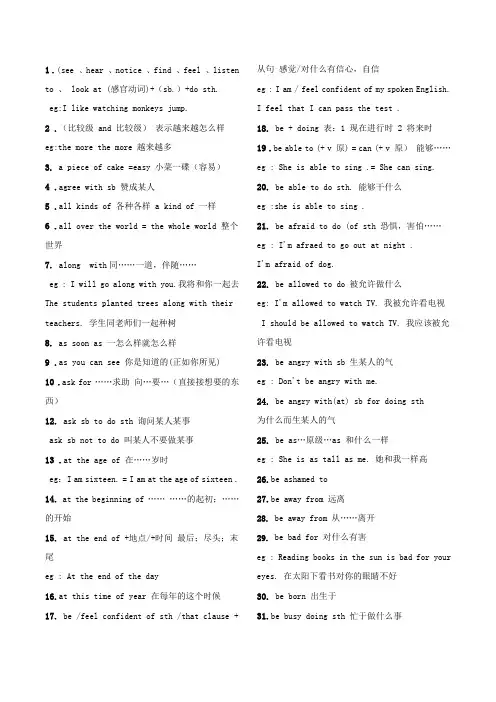
1 .(see 、hear 、notice 、find 、feel 、listen to 、 look at (感官动词)+(sb.)+do sth.eg:I like watching monkeys jump.2 .(比较级 and 比较级)表示越来越怎么样eg:the more the more 越来越多3. a piece of cake =easy 小菜一碟(容易)4 .agree with sb 赞成某人5 .all kinds of 各种各样 a kind of 一样6 .all over the world = the whole world 整个世界7. along with同……一道,伴随……eg : I will go along with you.我将和你一起去The students planted trees along with their teachers. 学生同老师们一起种树8. as soon as 一怎么样就怎么样9 .as you can see 你是知道的(正如你所见)10 .ask for ……求助向…要…(直接接想要的东西)12. ask sb to do sth 询问某人某事ask sb not to do 叫某人不要做某事13 .at the age of 在……岁时eg:I am sixteen. = I am at the age of sixteen .14.at the beginning of …… ……的起初;……的开始15. at the end of +地点/+时间最后;尽头;末尾eg : At the end of the day16.at this time of year 在每年的这个时候17. be /feel confident of sth /that clause +从句感觉/对什么有信心,自信eg : I am / feel confident of my spoken English.I feel that I can pass the test .18. be + doing 表:1 现在进行时 2 将来时19 .be able to (+ v 原) = can (+ v 原)能够…… eg : She is able to sing .= She can sing. 20. be able to do sth. 能够干什么eg :she is able to sing .21. be afraid to do (of sth 恐惧,害怕…… eg : I'm afraed to go out at night .I'm afraid of dog.22. be allowed to do 被允许做什么eg: I'm allowed to watch TV. 我被允许看电视I should be allowed to watch TV. 我应该被允许看电视23. be angry with sb 生某人的气eg : Don't be angry with me.24. be angry with(at) sb for doing sth为什么而生某人的气25.be as…原级…as 和什么一样eg : She is as tall as me. 她和我一样高26.be ashamed to27.be away from 远离28. be away from 从……离开29. be bad for 对什么有害eg : Reading books in the sun is bad for your eyes. 在太阳下看书对你的眼睛不好30. be born 出生于31.be busy doing sth 忙于做什么事be busy with sth 忙于……32. be careful 当心;小心33.be different from…… 和什么不一样34. be famous for 以……著名35. be friendly to sb 对某人友好36. be from = come from 来自eg :He is from Bejing.He comes from Bejing.Is he from Bejing ? Does he come from Bejing ?37. be full of 装满……的be filled with 充满eg: The glass is full of water.The glass is filled with water.38. be glad+to+do/从句39. be going to + v(原)将来时40. be good at(+doing) = do well in 在某方面善长, 善于……41. be good for 对什么有好处eg : Reading aloud is good for your English.42. be happy to do 很高兴做某事43. be helpful to sb 对某人有好处eg : Reading aloud is helpful to you. 大声朗读对你有好处Exercising is helpful to your body. 锻炼对你的身体有好处44. be in good health 身体健康45. be in trouble 处于困难中eg : She is in trouble. They are in tronble.46. be interested in 对某方面感兴趣47. be late for = come late to 迟到eg: Be late for class 上课迟到48. be like 像…… eg : I'm like my mother.49. be mad at 生某人的气50. be made from 由……制成(制成以后看不见原材料)51. be made of 由……制成(制成以后还看得见原材料)52.be not sure 表不确定53. be on a visit to 参观54. be popular with sb 受某人欢迎55. be quiet 安静56. be short for ···的缩写eg: 陶 is short for 陶俊杰57. be sick in bed 生病在床58.be sorry to do sth be sorry for sbeg : I am sorry for you.59. be sorry to hear that60.be sorry to trouble sbeg : I am sorry to trouble you .61. be strict in doing sth 严于做某事eg : He's strict in obeying rules .62. be strict with sb 对某人要求严格eg: Some students are not strict with themselves. 这些学生对自己不严格63. be strict with sb in sth 某方面对某人严格64. be supposed to do 被要求干什么65. be sure 表确定66.be sure of doing sth 对做某事有信心eg: He is sure of winning. I am sure of learning English well.67. be sure of sth 对做某事有信心eg: I'm sure of my head. (my teacher 我相信我的大脑(老师)68. be sure that sth 对做某事有信心eg: I'm suer that he can pass the test. 我相信他能通过考试69. be sure to do sth一定会做某事eg: We are sure to pass the test. 我们一定会通过这次考试 We are sure to learn English well. 我们一定能学好英语70. be terrified of + 名/动doing 害怕……71.be terrified to do sth 害怕做某事72.be the same as … 和什么一样73. be used to doing sth 习惯做某事eg: My father is used to getting up early. 我爸爸习惯早He is used to sleeping in class. 他习惯上课睡觉74. be worth doing 值-得做什么75. be(feel) afraid to do sth 害怕做某事be afraid of sth 害怕某物be afraid that 丛句76. because+句子 because of +短语eg : He was late because he had a headache. He was late because of his headache .77. begin to do = start to do 开始做某事s tart…with…=begin…with… 以什么开始什么eg : Let's begin the game with the song. I begin to go home78.between…and… 两者之间79. borrow sth from sb 向……借……lend sth to sb ( lend sb sth 借给……什么东西eg : I borrowed a pen from him he lent a pen to me. ( He lent me a pen. )80. both = the same(as) = not different(from) 表相同81. bother 打扰 bother sb to do stheg : I'm sorry to bother you ,but can you tell me to way to the station .我十分道歉打扰你,但是你能告诉我怎么去车站The problem has been bothering me for weeks. 这个问题困扰了我几个周了He's bothering me to lend him money .82. by the end of 到……为止83.call sb sth eg : We call him old wang.84. care 关心eg : Don't you care about this country's future ?你为什么不关心国家的未来85. catch up with sb 赶上某人86.chat with sb 和某人闲谈87. come in 进88. come over to 过来89. come up with 提出eg: Can you come up with a good idea? 你能想出一个好办法吗?90. communicate with sb 和某人交流91. consider + doing 考虑做什么eg : Why not consider going to lu zhou. 为什么不考虑去泸州?92. dance to 随着……跳舞eg : She likes dancing to the music .她喜欢随着音乐跳舞93. decide to do sth 决定做某事94.do a survey of 做某方面的调查95. do better in 在……方面做得更好96. do wrong 做错97.Don't forget to do sth 不要忘了做某事98.Don't mind +doing /从句 /名词不要介意……99. each +名(单)每一个…eg : Each student has many books.每一个学生都有一些书100.end up +doing101. enjoy +doing喜欢102. escape from 从……逃跑eg: The prisoners have escaped from the prison.犯人从监狱里逃跑出来103.expect to do sth 期待做某事104. fall down 摔下来 fall off 从哪摔下来105. fall in love with sb /sth 爱上什么106. far from 离某地远eg : The school is far from my home.107.find +it +adj. +to do 发现做某事怎么样108. find sb/sth +adj. 发现什么怎么样eg : I find the book interesting.109.finish 完成+doing(名词)110. fit to sb = be fit for sb 适合某人111.forget to do 没有做而忘了 forget doing 做了而又忘了eg: Don't forget to go home, I forget closing door .112.from…to… 从某某到某某eg: From me to her113. get /have sth down 做完,被(别人)做…eg: I have my hair cut. 我理了发(头发被剪了)Tom got his bad tooth pulled out. 汤母把他的坏牙拔掉了(被牙医拔掉了)114. get a part-time job= find a part-time job 115. get along well with sb = get on well with sb 与某人相处得好116. get along with sb = get on with sb 与某人相处117.get ready for = be ready for为什么而准备eg : I get ready for math exam.I am ready for math exam.118.get sb in to trouble给某人制造麻烦,使某人陷入麻烦119.get sb to do sth120.get…from… 从某处得到某物121. give a talk 做报告 eg: He is give a talk. 122. give sth. to sb.= give sb. sth.给某人某物123. go fish 钓鱼 go swimming 游泳124. go on to do 去做下一件事 go on doing 继续做这件事125. go out away from =go out of126. go to school 上学(用于专业的)go to the school 去学校(不一定是上学)127. good way to 好方法128. hate to do 讨厌没做过的事hate doing 讨厌做过的事129. have a party for sb 举办谁的晚会130.have a talk 听报告谈一谈131. have been doing 现在完成进行时eg : You have been talking You have been sleeping since.132.have been to …( 地方)……去过某过地方have gone to …(地方)去了某地还没回来133. have fun +doing 玩得高兴134.have sth to do 有什么事要做eg: I have a lot of homework to do. 我有很多家庭作业要做I have nothing to do. 我没什么事情做135. have to do sth 必须做某事136. have trouble (problem) (in) doing sth 做什么事情有麻烦137.have…time +doing138.have…(时间)…off 放……假eg: I have month off 我请一个月得假139. hear sb +do/doing 听见某人做某事/正在做某事140. help a lot 很大用处141. help sb with sth \one's sth 帮助某人某事(某方面) help sb (to) do sth 帮助某人做某事142. hope to do sth 希望做某事143. How about(+doing) = What about(+doing) 144. how do you like = what do you think of 你对什么的看法145. if : 是否=wethereg: I don't know if (wether) I should go to the party .我不知道我是否应该去参加晚会He don't know if (wether) we will arrive on time tomorrow morning .他不知道我们明天早上是否能准时到达146.if :如果,假如(全部接一般时态)+条件语态从句eg: I'll go to LuZhou if it does't rain. 假如明天不下雨,我就去泸州If they change the plan they will let me know. 假如他们要改变计划,他们会让我知道的I'll go to England ,if I have enough money next year .如果我明年由足够的钱,我就要去英国147. in one's opinion = sb think 某人认为148. in some ways 在某些方面149.in the end = finally(adv) 最后150.in the north of… 什么在什么的北方( north 北 sowth 南 west 西 east 东)151. in the sun 在太阳下152. increase 增加eg : They've increased the piece of petrol by 3% .他们把石油价增加了3%The population has increased from 12 million ten years ago to 18 million now .153. instead of +(名)代替eg: I'd like an apple instead of a pear. 我想要苹果,而不要梨子I like English instead of math. 我喜欢英语而不喜欢数学154. introduce sb to sb 介绍某人给某人introduce oneself 自我介绍155. invite sb to do sth 邀请某人做某事156. It takes sb sometime to do sth 做某人花掉某人多少时间eg : It took me 5 minutes to do my homework . It takes me half an hour to cook.157. It's +adj +for sb to do sth 对某人来说做某事怎么样158. It's +adj +to do 做某事怎么样159. It's +adj for sb 对于某人来说怎么样It's +adj of sb 对某人来说太怎么样160. It's +adj(for sb) to do(对某人来说)做某事怎么样It's +adj of sb to do sth 对某人来说做某事太怎么样eg : It's nice of you to help me with my English. 161. It's a good idea for sb to do sth 对…… 来说是个好主意162. It's important to sb 对某人来说很重要eg: It's important to me.163. It's time to do sth = It's time for sth 到了该去做某事的时间eg : It's time to have class It's time for class. 该去上课了164. join = take part in 参加165. just now 刚才166. keep +sb /sth +adj /介词短语让什么保持什么样?167. keep out 不让…… 进入168. keep sb adj 让……保持……eg: I want to keep my mother happy/ keep healthy.保持高兴/健康169. key to +名词表示:某物的钥匙或某题的答案170.key to… key 可以是答题或钥匙anser to …ugh at… 取笑……eg : Don't langh at others.We langhed at the joke.172. learn by oneslfe 自学173. learn from sb 向某人学习eg: We should learn from Lei Feng.174. learn to do sth 学做某事175. let sb do sth 让某人做某事176. Let sb down 让某人失望eg : We shouldn't let our farents down. 我们不应该让我们的父母失望177. live from :离某地远178. live in +大地方 /at +小地方居住在某地eg: I live in LuZhou.She lives at XuanTan . 179. look after = take care of 照顾照看180.lose one's way 谁迷路eg : Lose your way. 你迷路了181. make a decision to do sth 决定做某事182. make friends with sb 和谁成为朋友eg : I want to make friends with you.183. make it early 把时间定的早一点184. make on exhibition of oneself 让某人出洋相185. make sb /n +n 使什么成为什么eg : I made you my wife.186. make sb /sth +adj 使某人(某物)怎么样eg : You must made your bed clean.187. make sb /sth adj 使某人/某物怎么样188. make sb do sth 让某人做某事eg : I made him write. 我以前让他写189. make up be made up of (被动语态)由……组成190.make…difference to…191. mind sb to do mind one's doing 介意……做什么192. most +名 most of +代193. much too +形容词194.must be 一定195. need +名词196. need sb do sth 需要某人做某事197.need to do (实义动词) need do (情态动词)198. no /neithr of hate to do no /neithr of hate doing199. no +名词200. not anymore = no more 再也不……eg: He didn't cry any more He cried no more. 他再也不哭201.not… (形、副)at all eg: He's not tall at all she doesn't junp far at all .202.not…at all 一点都不203.not…either 表否定,也不eg : I don't have sister, either. 我也没有姐姐204.not…until 直到……才……eg: I didn't sleep until my mother came back. The child didn't stop crying until I give her sugar.205. offer / provide sb with sth 给某人提供206. offer sb sth ( offer sth to sb 提供什么东西给某人eg : I offer you water .(I offer water to you .)我给你提供水207.on one's way to… 在谁去那的路上208. on the one hand 一方面on the other hand 另一方面209. on the phone = over the phone 用电话交谈210. on time 准时 in time 及时211. one day =some day =someday 一天,有一天212. one of +可数名词的复数形式213. one to another 一个到另一个214. over and over agin 一遍又一遍的eg : He cleaned the floor over and over agin . 215. part-time job 兼职工作 fall-time job 全职工作216.pay for… 付……钱 pay the bill 开钱,付钱217. please +do218. please help yourself219. pleased with sb220. pool into = pore into221. practice +doing 练习做某事222. prefer sth to sth 相对……更喜欢……eg : I prefer physics to chemisty.在物理和化学中,我更喜欢物理prefer doing to sth 更喜欢去做…不愿意去做… eg: He prefers riding a bike to diving.他更喜欢骑自行车,不开小车prefer to do sth rather than do sth 宁愿做…也不愿eg: My unde prefers to buy a now car rather than repaiv the used one. 我叔叔更喜欢买新的车,也不去修旧车prefer sb not to do sth 更愿意…eg: I prefer her not to come 我不喜欢她不来223. pretend to do sth 装着去做什么pretend that 从句eg : The two cheats pretended to be working very hard .这两个骗子装着努力工作He pretended that he did not know the answer .他装着不知道答案224 .rather…than 宁可……也不……eg : I would rather be a doctor than a teacher. 我愿肯当医生,也不当老师He likes dogs rather than cats. 他喜欢狗,不喜欢猫225.regard…as 把……当作…… eg: Please give my best regards to your family. 请带我向你的家人我最好的问候I regard you as my friend. 我把你当作我的朋友He shows little regard for others.他不爱关心别人226. remid sb about sth 提醒某人什么事remid sb to do sth 提醒某人做某事eg : he remids me about cooking (He remids me to cook. 他提醒我做饭227. remid sb of sth 使某人想起什么eg : The pictures remind me of my school days. 这照片使我想起了我的学校T he wor ds that (which) the teacher talke to remind me of my mother.228. return sth to sb 还什么东西给某人229. say to oneself 对自己说230. say to sb 对某人说231. sb spend somemoney on sth 花了多少钱在某事上232. sb spend sometime with sb 花了多少时间陪谁233. sb spend sometime(in) doing sth 花了多少时间做某事234. sb with sb +is sb and sb +are235. see sb do 看见某人做过某事see sb doing 看见某人正在做某事236. seem to do/be +adj 显得怎么样eg : You seem to be tired .You seem to be happy. 237. send +sb sth 送给某人某物238.send…to…把什么寄到哪里去?239. shock 使……震惊eg : Oh , It's only you ! You give me a shock .啊,是你呀!吓我一跳240. show sb sth 向某人展示某物eg : I show her the book.241. show sb sth = show sth to sb 拿什么东西给某人看eg: Show me your pen.= Show your pen to me. 242. show sth to sb 向某人展示某物eg : I show the book to her.243. some…others… 一些……另一些…… 244.start…with… 从……开始begin…with… 从……开始。
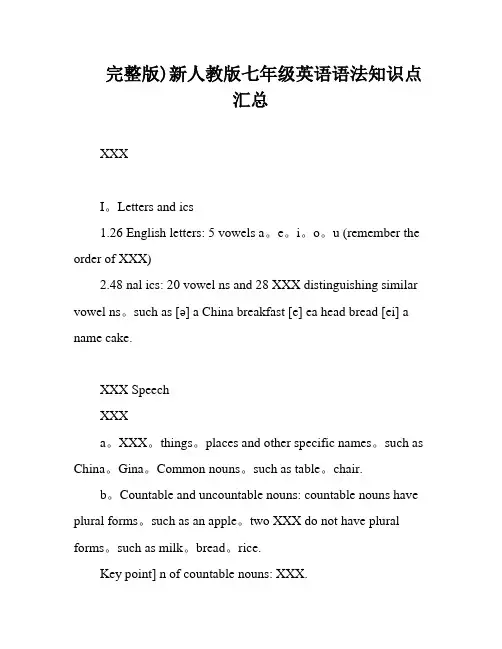
完整版)新人教版七年级英语语法知识点汇总XXXI。
Letters and ics1.26 English letters: 5 vowels a。
e。
i。
o。
u (remember the order of XXX)2.48 nal ics: 20 vowel ns and 28 XXX distinguishing similar vowel ns。
such as [ə] a China breakfast [e] ea head bread [ei] a name cake.XXX SpeechXXXa。
XXX。
things。
places and other specific names。
such as China。
Gina。
Common nouns。
such as table。
chair.b。
Countable and uncountable nouns: countable nouns have plural forms。
such as an apple。
two XXX do not have plural forms。
such as milk。
bread。
rice.Key point] n of countable nouns: XXX.Regular changes:1.In general。
add "-s" directly to the end of the word。
suchas bag-bags。
day-days。
boy-boys。
key-keys。
etc.2.Words ending in s。
x。
sh。
and ch need to add "-es" to the end of the word。
such as bus-buses。
watch-watches。
box-boxes。
etc.3.XXX plus y need to change y to i and then add "-es"。
人教版初中英语语法点以下为您提供 20 个人教版初中英语的相关知识点:1. 语法点:一般现在时- 英语释义:The present simple tense is used to talk about habitual actions, facts, and general truths.- 短语:often, usually, sometimes, always- 单词:go, come, do, have- 用法:主语 + 动词原形(当主语是第三人称单数时,动词加s/es)- 双语例句:I often go to school by bike. (我经常骑自行车上学。
)He always gets up early. (他总是起得很早。
)2. 语法点:现在进行时- 英语释义:The present continuous tense is used to describe an action that is happening at the moment of speaking.- 短语:now, at the moment- 单词:read, write, listen, watch- 用法:主语 + am/is/are + 动词 -ing- 双语例句:I'm reading a book now. (我现在正在读一本书。
)They are playing football at the moment. (他们此刻正在踢足球。
)3. 语法点:一般过去时- 英语释义:The past simple tense is used to talk about actions or events that happened in the past and are now finished.- 短语:yesterday, last week, ago- 单词:go - went, do - did, have - had- 用法:主语 + 动词过去式- 双语例句:I went to Beijing last year. (我去年去了北京。
1.see、hear、notice、find、feel、listento、lookat感官动词+sb.+dosth.eg:Ilikewatchingmonkeysjump.2.比较级and比较级表示越来越怎么样eg:themorethemore越来越多=easy小菜一碟容易赞成某人各种各样akindof一样=thewholeworld整个世界同……一道,伴随……eg:Iwillgoalongwithyou.我将和你一起去Thestudentsplantedtreesalongwiththeirteacher s.学生同老师们一起种树一怎么样就怎么样你是知道的正如你所见……求助向…要…直接接想要的东西询问某人某事asksbnottodo叫某人不要做某事在……岁时eg:Iamsixteen.=Iamattheageofsixteen. …………的起初;……的开始+地点/+时间最后;尽头;末尾eg:Attheendoftheday在每年的这个时候feelconfidentofsth/thatclause+从句感觉/对什么有信心,自信eg:Iam/feelconfidentofmyspokenEnglish. IfeelthatIcanpassthetest.+doing表:1现在进行时2将来时+v原=can+v原能够……eg:Sheisabletosing.=Shecansing..能够干什么eg:sheisabletosing.ofsth恐惧,害怕……eg:I'mafraedtogooutatnight.I'mafraidofdog.被允许做什么eg:I'mallowedtowatchTV.我被允许看电视IshouldbeallowedtowatchTV.我应该被允许看电视生某人的气eg:Don'tbeangrywithme.atsbfordoingsth为什么而生某人的气…原级…as和什么一样eg:Sheisastallasme.她和我一样高远离从……离开对什么有害eg:Readingbooksinthesunisbadforyoureyes.在太阳下看书对你的眼睛不好出生于忙于做什么事bebusywithsth忙于……当心;小心……和什么不一样以……着名对某人友好=comefrom来自eg:HeisfromBejing.HecomesfromBejing. IshefromBejingDoeshecomefromBejing装满……的befilledwith充满eg:Theglassisfullofwater. Theglassisfilledwithwater.+to+do/从句+v原将来时+doing=dowellin在某方面善长,善于……对什么有好处eg:ReadingaloudisgoodforyourEnglish.很高兴做某事对某人有好处eg:Readingaloudishelpfultoyou.大声朗读对你有好处Exercisingishelpfultoyourbody.锻炼对你的身体有好处身体健康处于困难中eg:.对某方面感兴趣=comelateto迟到eg:Belateforclass上课迟到像……eg:I'mlikemymother.生某人的气由……制成制成以后看不见原材料由……制成制成以后还看得见原材料表不确定参观受某人欢迎安静···的缩写eg:陶isshortfor陶俊杰生病在床eg:Iamsorryforyou.eg:Iamsorrytotroubleyou.严于做某事eg:He'sstrictinobeyingrules.对某人要求严格eg:Somestudentsarenotstrictwith themselves.这些学生对自己不严格某方面对某人严格被要求干什么表确定对做某事有信心eg:.对做某事有信心eg:I'msureofmyhead.myteacher我相信我的大脑老师对做某事有信心eg:I'msuerthathecanpassthetest.我相信他能通过考试一定会做某事eg:Wearesuretopassthetest.我们一定会通过这次考试WearesuretolearnEnglishwell.我们一定能学好英语+名/动doing害怕……害怕做某事…和什么一样习惯做某事eg:Myfatherisusedtogettingupearly.我爸爸习惯早Heisusedtosleepinginclass.他习惯上课睡觉值-得做什么feelafraidtodosth害怕做某事beafraidofsth害怕某物beafraidthat丛句+句子becauseof+短语eg:Hewaslatebecausehehadaheadache. Hewaslatebecauseofhisheadache.=starttodo开始做某事start…with…=begin…with…以什么开始什么eg:Let'sbeginthegamewiththesong. Ibegintogohome…and…两者之间向……借……lendsthtosblendsbsth借给……什么东西eg:Iborrowedapenfromhimhelentapentome.Helent meapen.=thesameas=notdifferentfrom表相同打扰bothersbtodostheg:I'msorrytobotheryou,butcanyoutellmetowayt othestation.我十分道歉打扰你,但是你能告诉我怎么去车站Theproblemhasbeenbotheringmeforweeks.这个问题困扰了我几个周了He'sbotheringmetolendhimmoney.到……为止:Wecallhimold wang.关心eg:Don'tyoucareaboutthiscountry'sfuture你为什么不关心国家的未来赶上某人和某人闲谈进过来提出eg:Canyoucomeupwithagoodidea你能想出一个好办法吗和某人交流+doing考虑做什么eg:Whynotconsidergoingtoluzhou.为什么不考虑去泸州随着……跳舞eg:Shelikesdancingtothemusic.她喜欢随着音乐跳舞决定做某事做某方面的调查在……方面做得更好做错'tforgettodosth不要忘了做某事'tmind+doing/从句/名词不要介意……+名单每一个…eg:Eachstudenthasmanybooks.每一个学生都有一些书+doing+doing喜欢从……逃跑eg:Theprisonershaveescapedfromtheprison.犯人从监狱里逃跑出来期待做某事摔下来falloff从哪摔下来sth爱上什么离某地远eg:Theschoolisfarfrommyhome.+it+adj.+todo发现做某事怎么样sth+adj.发现什么怎么样eg:Ifindthebookinteresting.完成+doing名词=befitforsb适合某人没有做而忘了forgetdoing做了而又忘了eg:Don'tforgettogohome,Iforgetclosingdoor. …to…从某某到某某eg:Frommetoherhavesthdown做完,被别人做…eg:Ihavemyhaircut.我理了发头发被剪了Tomgothisbadtoothpulledout.汤母把他的坏牙拔掉了被牙医拔掉了==getonwellwithsb与某人相处得好=getonwithsb与某人相处=bereadyfor为什么而准备eg:Igetreadyformathexam. Iamreadyformathexam.给某人制造麻烦,使某人陷入麻烦…from…从某处得到某物做报告eg:Heisgiveatalk.给某人某物钓鱼goswimming游泳去做下一件事goondoing继续做这件事=gooutof上学用于专业的gototheschool去学校不一定是上学好方法讨厌没做过的事hatedoing讨厌做过的事举办谁的晚会听报告谈一谈现在完成进行时eg:YouhavebeentalkingYouhavebeensleepingsinc e.…地方……去过某过地方havegoneto…地方去了某地还没回来+doing玩得高兴有什么事要做eg:Ihavealotofhomeworktodo.我有很多家庭作业要做Ihavenothingtodo.我没什么事情做必须做某事problemindoingsth做什么事情有麻烦…time+doing…时间…off放……假eg:Ihavemonthoff我请一个月得假+do/doing听见某人做某事/正在做某事很大用处\one'ssth帮助某人某事某方面helpsbtodosth帮助某人做某事希望做某事+doing=Whatabout+doing=whatdoyouthinkof你对什么的看法:是否=wethereg:Idon'tknowifwetherIshouldgototheparty.我不知道我是否应该去参加晚会Hedon'tknowifwetherwewillarriveontimetomorro wmorning.他不知道我们明天早上是否能准时到达:如果,假如全部接一般时态+条件语态从句eg:I'llgotoLuZhouifitdoes'train.假如明天不下雨,我就去泸州Iftheychangetheplantheywillletmeknow.假如他们要改变计划,他们会让我知道的I'llgotoEngland,ifIhaveenoughmoneynextyear.如果我明年由足够的钱,我就要去英国'sopinion=sbthink某人认为在某些方面=finallyadv最后…什么在什么的北方north北sowth南west西east 东在太阳下增加eg:They'veincreasedthepieceofpetrolby3%.他们把石油价增加了3%Thepopulationhas increasedfrom12milliontenyea rsago to18millionnow.+名代替eg:I'dlikeanappleinsteadofapear.我想要苹果,而不要梨子IlikeEnglishinsteadofmath.我喜欢英语而不喜欢数学介绍某人给某人introduceoneself自我介绍邀请某人做某事做某人花掉某人多少时间eg:Ittookme5minutestodomyhomework. Ittakesmehalfanhourtocook.'s+adj+forsbtodosth对某人来说做某事怎么样's+adj+todo做某事怎么样's+adjforsb对于某人来说怎么样It's+adjofsb对某人来说太怎么样's+adjforsbtodo对某人来说做某事怎么样It's+adjofsbtodosth对某人来说做某事太怎么样eg:It'sniceofyoutohelpmewithmyEnglish.'sagoodideaforsbtodosth对……来说是个好主意'simportanttosb对某人来说很重要eg:It'simportanttome.'stimetodosth=It'stimeforsth到了该去做某事的时间eg:It'stimetohaveclassIt'stimeforclass.该去上课了=takepartin参加刚才+sb/sth+adj/介词短语让什么保持什么样不让……进入让……保持……eg:Iwanttokeepmymotherhappy/keephealthy.保持高兴/健康+名词表示:某物的钥匙或某题的答案…key可以是答题或钥匙anserto……取笑……eg:Don'tlanghatothers.Welanghedatthejoke.自学向某人学习eg:WeshouldlearnfromLeiFeng.学做某事让某人做某事让某人失望eg:Weshouldn'tletourfarentsdown.我们不应该让我们的父母失望:离某地远+大地方/at+小地方居住在某地eg:.=takecareof照顾照看'sway谁迷路eg:Loseyourway.你迷路了决定做某事和谁成为朋友eg:Iwanttomakefriendswithyou.把时间定的早一点让某人出洋相n+n使什么成为什么eg:Imadeyoumywife.sth+adj使某人某物怎么样eg:Youmustmadeyourbedclean.sthadj使某人/某物怎么样让某人做某事eg:Imadehimwrite.我以前让他写被动语态由……组成…differenceto…'sdoing介意……做什么+名mostof+代+形容词一定+名词需要某人做某事实义动词needdo情态动词neithrofhatetodono/neithrofhatedoing+名词=nomore再也不……eg:Hedidn'tcryanymoreHecriednomore.他再也不哭…形、副atalleg:He'snottallatallshedoesn'tjunpfaratall. …atall一点都不…either表否定,也不eg:Idon'thavesister,either.我也没有姐姐…unti l直到……才……eg:Ididn''tstopcryinguntilIgivehersugar. providesbwithsth给某人提供offersthtosb提供什么东西给某人eg:Iofferyouwater.Iofferwatertoyou.我给你提供水'swayto…在谁去那的路上一方面ontheotherhand另一方面=overthephone用电话交谈准时intime及时=someday=someday一天,有一天+可数名词的复数形式一个到另一个一遍又一遍的eg:Hecleanedtheflooroverandoveragin.兼职工作fall-timejob全职工作…付……钱paythebill开钱,付钱+do=poreinto+doing练习做某事相对……更喜欢……eg:Ipreferphysicstochemisty.在物理和化学中,我更喜欢物理preferdoingtosth更喜欢去做…不愿意去做…eg:Heprefersridingabiketodiving.他更喜欢骑自行车,不开小车prefertodosthratherthandosth宁愿做…也不愿eg:Myundepreferstobuyanowcarratherthanrepaiv theusedone.我叔叔更喜欢买新的车,也不去修旧车prefersbnottodosth更愿意…eg:Ipreferhernottocome我不喜欢她不来装着去做什么pretendthat从句eg:Thetwocheatspretendedtobeworkingveryhard.这两个骗子装着努力工作Hepretendedthathedidnotknowtheanswer.他装着不知道答案…than宁可……也不……eg:Iwouldratherbeadoctorthanateacher.我愿肯当医生,也不当老师Helikesdogsratherthancats.他喜欢狗,不喜欢猫…as把……当作……eg:Pleasegivemybestregardstoyourfamily.请带我向你的家人我最好的问候Iregardyouasmyfriend.我把你当作我的朋友Heshowslittleregardforothers.他不爱关心别人提醒某人什么事remidsbtodosth提醒某人做某事eg:heremidsmeaboutcookingHeremidsmetocook.他提醒我做饭使某人想起什么eg:Thepicturesremindmeofmyschooldays.这照片使我想起了我的学校T hewor dsthatwhichtheteachertalketoremindmeof mymother.还什么东西给某人对自己说对某人说花了多少钱在某事上花了多少时间陪谁indoingsth花了多少时间做某事+issbandsb+are看见某人做过某事seesbdoing看见某人正在做某事be+adj显得怎么样eg:.+sbsth送给某人某物…to…把什么寄到哪里去使……震惊eg:Oh,It'sonlyyouYougivemeashock.啊,是你呀吓我一跳向某人展示某物eg:Ishowherthebook.=showsthtosb拿什么东西给某人看eg:Showmeyourpen.=Showyourpentome.向某人展示某物eg:Ishowthebooktoher.…others…一些……另一些………with…从……开始begin…with…从……开始远离……eg:We'retoldtostayawayfromtheanimalswhevisit ingthezoo.当我们参观zoo时,我们要远离动物Ifyouwanttoloseweightyou'dbetterstayauayfrom thesweetfood.如果你想减肥,你最好远离甜食停下正在做的事阻止某人做某事fromdoing阻止某人做某事停下正在做的事去做下一件事+名这样,这种适合某人使某人惊奇toone'ssurprise令某人惊奇上课把某人带去eg:Itakeyoutothehospital.=takeawalk=goforawalk散步256.①talkto对谁说eg:Italktoyou.②talkwith和谁说eg:Italkwithhim.③talkof谈到eg:wetalkedofyou.④talkabout谈论关于……和某人说话教某人做某事告诉某人做某事丛句tellsbnottodosthtellastory告诉某人某事告诉某人做什么tellsbnottodosth告诉某人不要做什么…from…+doing+名词doing+as………名…asas…adjadv…as相同=thewayofdoingsth做某方面的方法thewayto+地方去哪的路eg:DoyouknowthewaytolearnEnglish. DoyouknowthewayoflearningEnglish.…地点到哪的…to…太怎样而不能……adj+enoughto足够…能…so…that+丛句eg:Heistooyoungtogotoschool.=Heissoyoungthathecan'tgotoschool Heisoldenoughtogotoschool.=Heissooldthathecangotoschool. ……into……把什么翻译成什么eg:TrasalteEnglishintochinese.和某人去旅游'sbesttodosth尽某人最大的努力去做某事eg:想干什么,但没成功trydoingsth想干什么,已经做过了eg:Hetriedtoclimb.他想爬上去但没成功Hetriedclimbing.他想爬上去已经做过了…试衣服haveatry试一下开小←→turnup开大关上←→turnon打开open拆开倒着…参观某个地方等某人。
中考英语语法知识归纳总结人教版中考英语语法知识归纳总结(人教版)1. 一般现在时(Simple Present Tense)一般现在时用于描述经常性或总是发生的动作或情况。
主语为第三人称单数时,动词要加s或es。
2. 一般过去时(Simple Past Tense)一般过去时用于过去发生的动作或状态。
动词的过去式通常是加ed,但也存在一些不规则动词。
3. 现在进行时(Present Continuous Tense)现在进行时用于描述现在正在进行的动作,动词后要加ing。
4. 一般将来时(Simple Future Tense)一般将来时用于表示将来发生的动作,通常在动词前加will或be going to。
5. 情态动词(Modal Verbs)情态动词是一类特殊的动词,用于表示能力、可能性、许可、义务、建议等。
常见的情态动词有can、could、may、might、shall、should、will、would、must等。
6. 被动语态(Passive Voice)被动语态是指不直接说明动作的主体,而是将动作所受的影响或动作的承受者放在句子的主语位置。
主动句的主语变为被动句的宾语,谓语动词由“be+过去分词”构成。
7. 状语从句(Adverbial Clauses)状语从句用于修饰句子中的动词、形容词或副词,常见的包括时间状语从句、地点状语从句、条件状语从句、原因状语从句、结果状语从句等。
8. 定语从句(Adjective Clauses)定语从句用于修饰名词或代词,来限定或说明其意义。
引导定语从句的关联词有who、which、that、whose等。
9. 名词性从句(Noun Clauses)名词性从句用作句子的主语、宾语、表语等成分。
常见的名词性从句有主语从句、宾语从句、表语从句和同位语从句等。
10. 直接引语和间接引语(Direct and Indirect Speech)直接引语是直接引述别人的话,需用引号括起来;间接引语是将别人的话间接转述,需进行相应的句法和时态变化。
人教版初中英语语法知识点总结归纳一、名词1. 名词概念简介在学习初中英语的过程中,名词是我们最先接触到的语法知识点之一。
名词是指表示人、事物、地方、抽象概念等的词,它是英语中最基本的词类之一。
2. 名词的分类和用法在人教版初中英语教材中,我们学习了可数名词和不可数名词的区别与用法。
可数名词可以用来表示一个或多个单独的事物,而不可数名词则表示不可数的整体或抽象概念。
3. 名词的复数形式当名词为可数名词时,我们需要学习其复数形式的变化规则。
在英语中,名词的复数形式有一定的规律,大部分名词在末尾加上-s即可表示复数形式,但也有一些特殊情况需要特别注意。
二、代词1. 代词的使用范围及特点代词是用来代替名词或其他词类的词,在英语句子中起着非常重要的作用。
在人教版初中英语教材中,我们学习了人称代词、指示代词、不定代词等不同种类的代词,并了解了它们的不同用法和语法规则。
2. 反身代词的用法反身代词是一种特殊的代词,它在句子中的使用具有一定的限制条件。
学习反身代词的用法可以帮助我们更准确地表达自己在交流中的意思。
三、动词1. 动词时态的使用动词时态是初中英语学习中的重要知识点之一。
在人教版初中英语教材中,我们学习了一般现在时、一般过去时、一般将来时等不同的时态,了解了它们的用法和相互转换的规则。
2. 动词的语态除了时态以外,动词的语态也是我们需要掌握的重要知识点之一。
英语中的动词有主动语态和被动语态两种,它们在句子中的使用与汉语有很大的不同,需要我们花费一定的时间和精力去理解和掌握。
四、形容词与副词1. 形容词的修饰作用形容词是用来修饰名词或代词的词,它可以帮助我们更具体地描述一个事物的特征或性质。
学习形容词的用法可以使我们在表达时更加生动、明了。
2. 副词的修饰作用副词是用来修饰动词、形容词、其他副词或整个句子的词,它可以帮助我们更准确地表达时间、地点、原因、目的等概念。
在人教版初中英语教材中,我们学习了副词的不同种类和用法,了解了它们在句子中的位置和作用。
初中英语语法总复习一、时态一般现在时定义:经常、反复发生的动作或行为及现在的某种状况。
动词用原形(单三人称动词加s / es)(问句和否定句借用助词do / does)一般过去时定义:过去某个时间里发生的动作或状态;过去习惯性、经常性的动作、行为。
动词用过去式(问句和否定句借用助词did)现在进行时定义:表示现阶段或说话时正在进行的动作及行为。
am +动词-ingis +动词-ingare +动词-ing过去进行时定义:表示过去某段时间或某一时刻正在发生或进行的行为或动作。
was +动词-ingwere +动词-ing一般将来时定义:以过去某个时间为标准,在此以前发生的动作或行为,或在过去某动作之前完成的行为,即“过去的过去”。
(1)will + 动词原形(2)am +going to+动词原形Is +going to+动词原形are +going to+动词原形过去将来时定义:立足于过去某一时刻,从过去看将来,常用于宾语从句中。
(1)would + 动词原形(2)was +going to+动词原形were +going to+动词原形现在完成时定义:过去发生或已经完成的动作对现在造成的影响或结果,或从过去已经开始,持续到现在的动作或状态。
have +过去分词has +过去分词过去完成时定义:以过去某个时间为标准,在此以前发生的动作或行为,或在过去某动作之前完成的行为,即“过去的过去”。
had +过去分词1. 不定式定义:由to+动词原形构成。
不定式是一种非限定性动词。
而非限定动词是指那些在句中不能单独充当谓语的动词,可分为不定式,动名词,现在分词和过去分词。
2.用途:在句中不能作谓语。
它具有动词的性质,本身可以带宾语和状语。
【动词不定式】1.定义:动词+ 不定式2.用途:动词不定式在句中可以作句子任何成分。
动词不定式的被动形式除了一般形式外还有其完成式和进行式。
[编辑本段][动词不定式的时态、语态]动词不定式可以作以上各种成分,但它毕竟是动词,所以有动词的属性动词不定式及其短语还可以有自己的宾语、状语,虽然动词不定式在语法上没有表面上的直接主语,但它表达的意义是动作,这一动作一定由使动者发出。
这一使动者我们称之为逻辑主语,其形式如下:主动形式被动形式一般式(not)to make (not)to be made完成式(not)to have made (not)to have been made进行式(not)to be making完成进行式(not)to have been making(1)语态如果动词不定式的逻辑主语是这个不定式所表示的动作的承受者,不定式一般要用被动语态形式。
如:It's a great honour to be invited to Mary's birthday party.(不定式作主语)It was impossible for lost time to be made up.(不定式作主语)I wish to be sent to work in the country.(不定式作宾语)Can you tell me which is the car to be repaired?(不定式作定语)He went to the hospital to be examined.(不定式作状语)在There be结构中,修饰主语的不定式可用被动,也可用主动。
如:There are still many things to t ake care of (to be taken care of).但有时两种形式表达的意思不同,如:These is nothing to do now.( We have nothing to do now.) There is nothing to be done now.(We can do nothing now.) (2)时态1) 现在时:一般现在时表示的动词,有时与谓语动词表示的动作同时发生,有时发生在谓语动词的动作之后。
He seems to know this.I hope to see you again. = I hope that I'll see you again. 我希望再见到你。
2) 完成时:表示的动作发生在谓语动词表示的动作之前。
I'm sorry to have given you so much trouble.He seems to have caught a cold.3) 进行时:表示动作正在进行,与谓语动词表示的动作同时发生。
He seems to be eating something.4) 完成进行时:She is known to have been wreaking on the problem for many years.[编辑本段][疑问词+不定式结构]疑问词who,what,which,when,where,whether,how后可接不定式构成不定式短语,在句中作主语、宾语、表语等。
如:①When to leave for London has not been decided yet. (不定式在句子中做主语)②Mr. Smith didn't know whether to leave or stay there. (不定式在句子中做宾语)③I asked Professor Xu how to learn English well. (不定式在句子中做间接宾语)④The question was where to get the medicine needed. (不定式在句子中表语)以上例句中疑问词+不定式部分,均可转换为相应的从句形式。
如:①When we shall leave…③…how Icould learn…经常在这种结构中使用的动词有:consider,decide,discover,explain,find out,forget,hear,know,lea rn,observe,understand,wonder等。
[编辑本段][动词不定式的语法功能]一、作主语动词不定式作主语时,句子的谓语动词常用单数,其位置有以下两种:(1)把不定式置于句首。
如:To get there by bike will take us half an hour.(2)用it作形式主语,把真正的主语不定式置于句后,常用于下列句式中。
如:①It+be+名词+to doIt's our duty to take good care of the old.②It takes sb+some time+to doHow long did it take you to finish the work?③It+be+形容词+for sb+to doIt is difficult for us to finish writing the compositionin a quarter of an hour.④It+be+形容词+of sb+to doIt is stupid of you to write down everything the teachersays. ⑤It seems(appears)+形容词+to do动名词的规则变化1 一般情况下,直接在动词后加-ing (现在进行时)work ---- working study -----studying2 动词以不发音的-e结尾,要去-e加-ing take ----- taking make ----- making3 重读闭音节的动词,要双写词尾字母,再加-ing cut ----- cutting put begin4 以-ie结尾的动词,把变成y再加-ing lie ----- lying tie ----- tying die ----- dying1.英语构词法汇2.英语语法汇总及练习3.复合句见语法书。
【第1讲:名词】名词复数的特殊变化。
普通名词的复数我们知道是直接加-s或-es,a. class, box, watch, brush等词以s, x, ch, sh, 结尾,复数要加-es;b. story, factory 等以"辅音字母+y"结尾的词复数要先将-y 变成-i再加-es;c. knife, wife, life等以-f 或-fe结尾的词一般先将-f或-fe变为-v, 再加-es;d. 以-o结尾的名词,一般来说,末尾是"元音字母+o" 的词加-s,我们学过的有radio,zoo。
末尾是"辅音字母+o"的词,变复数加-es。
如:tomato, hero, potato,当然其中的piano 和photo,又是一个例外,他们的结尾只能加-s。
e. child(children), foot(feet), tooth(teeth), mouse(mice), man(men ), woman(women )等词的复数变化全不遵循规则。
注意:与man 和woman构成的合成词,其复数形式也是-men 和-women。
如:an Englishman,two Englishmen. 但German不是合成词,故复数形式为Germans;f. deer,sheep等词单复数同形。
people,police,cattle 等词,以单数形式出现,但实为复数,所以它们的谓语当然也是复数形式,这就是集体名词。
the English,the French,the Chinese 等名词表示国民总称时,也作复数用。
注意:maths,politics,physics等学科名词,虽然以-s结尾,仍为不可数名词。
还有theUnited States(美国),the United Nations(联合国)等应视为单数。
别奇怪,名词有时也可以作定语的。
它作定语时一般用单数,但也有以下例外。
a. man, woman等作定语时,它的单复数以其所修饰的名词的单复数而定。
如:men workers,women teachers。
b. 数词+名词作定语时,这个名词一般保留单数形式,中间加连字符。
如:a ten-mile walk 十里路,two-hundred trees 两百棵树。
【第2讲:代词】代词中第一个“小个性”就是物主代词。
像my和mine这两个小冤家总是让人分不清谁是谁。
但你只要记住它们最重要的区别—my的后面一定要接名词,不可以单独出现,只能做定语,如:my father;而mine则是名词性,只能单独出现,在句中做主语和表语。